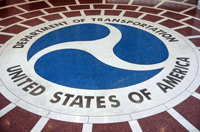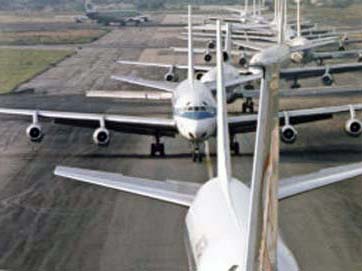DOT complaints soared by more than 1,700 percent after DOT’s airline refund rules notice. Here are DOT’s answers
 The Department of Transportation (DOT) released its enforcement notice about airline refund rules on April 3, 2020. DOT told airlines that any flight canceled by the airlines must be refunded in cash. Immediately, Travelers United raised several questions about the notice.
The Department of Transportation (DOT) released its enforcement notice about airline refund rules on April 3, 2020. DOT told airlines that any flight canceled by the airlines must be refunded in cash. Immediately, Travelers United raised several questions about the notice.
NOTE: This is a reprise of an article published about four and a half years ago. The refund issues are not going away. I am republishing this post so that those who do not know the rules will be reminded. And, so that readers will pass these rules along to friends who are having problems with refunds. Plus, the DOT is currently working on a new rulemaking regarding refunds.
We asked about whether the notice applied to foreign carriers. How did they propose to handle travel agencies that balked at providing refunds? Can airlines change their contracts of carriage as they attempt to apply new conditions to tickets purchased before the contract changes?
DOT’s enforcement division immediately answered several consumer group questions. However, airline actions that made some refunds more difficult needed a response by DOT. Complaints filed by consumers grew by almost 1,700 percent. From a similar period last year to March and April of 2020, air travel service complaints grew from 1,500 to more than 25,000.
Note: Consumers should ALWAYS send complaints to DOT whenever sending complaints to airlines. DOT uses these complaints to issue regulations, notices, and clarifications such as in this case.
DOT’s Aviation Enforcement Office released these FAQs clarifying the most common questions on May 12, 2020
This list of frequently asked questions (FAQs) should help consumers understand their rights and to ensure airlines and ticket agents are complying with aviation consumer protection requirements. These answers are a blend of DOT wording and clarifications from Travelers United. They present the DOT’s intent.
1. What rights do passengers have if an airline cancels a flight or makes a significant schedule change? What is a “significant change” or “cancellation” requiring a refund?
Airlines must provide a refund to a ticketed passenger when the carrier cancels or significantly changes the passenger’s flight and the passenger chooses not to accept an alternative offered by the carrier. However, neither the term “significant change” nor “cancellation” is defined in regulation or statute. Based on the Aviation Enforcement Office’s review of the refund policies and practices of US and foreign air carriers, airlines define “significant change” and “cancellation” differently when fulfilling their obligation to provide refunds. Because “cancellation” and “significant change” are not defined in the context of ticket refunds, airlines may develop reasonable interpretations of those terms.
- Redefining any past definitions of cancellation or significant change retroactively is unfair and deceptive.
- DOT is authorized to investigate unfair and deceptive practices.
- Refusal to refund airfares where the service is not provided constitutes unfair and deceptive practices.
- The Department considers a practice to be unfair to consumers if it (1) causes or is likely to cause substantial injury to consumers, (2) cannot be reasonably avoided by consumers, and (3) is not outweighed by countervailing benefits to consumers or to the competition. The Department considers a practice to be “deceptive” to consumers if it is likely to mislead a consumer, acting reasonably under the circumstances, with respect to a material matter.
2. What rights do passengers have if they choose not to travel due to safety or health concerns related to the COVID-19 public health emergency?
According to airline contracts of carriage, passengers may change or cancel their reservations. However, these passengers are generally not entitled to a refund or a travel voucher for future use on the airline. This is true even if the change or cancellation is due to concerns related to the COVID-19 public health emergency.
Many airlines are providing airline flight credits or vouchers that can be used for future travel for those passengers electing to cancel their travel due to health or safety concerns related to COVID-19. DOT will closely examine any allegation that an airline misled a passenger about the status of a flight to avoid having to offer a refund.
Note: Unfortunately, there is no uniformity when it comes to airline flight credits.
DOT must as part of the rulemaking, make it easier for consumers to understand the airline flight credit rules. This is the passenger’s money. It should be treated as a gift card. The only requirement allowed should be that the credits must be used through the airline that provided the flight credit. There should be no restrictions on the spending of the credits. It should be established that the money belongs to the consumer, not the airline.
READ ALSO ON TRAVELERS UNITED:
Cash is king for COVID-19 airfare cancellation refunds
I need more than a mask to save me from COVID-19 on planes
3. What rights do passengers have if they purchase their airline ticket from an online travel agency?
Travel agents are required to make “proper” refunds when service cannot be performed as contracted. This applies on a flight to, within, or from the United States. Ticket agents must provide “proper” refunds including providing refunds in any instance when the following conditions are met:
- an airline cancels or significantly changes a flight,
- an airline acknowledges that a consumer is entitled to a refund, and
- passenger funds are held by a ticket agent.
In enforcing the requirement for ticket agents to make “proper” refunds, the Aviation Enforcement Office will focus on the totality of the circumstances.
Contract changes cannot be made retroactively
Airlines and ticket agents may not apply changes to their contracts of carriage retroactively that affect consumer refunds negatively. The refund policy in place when the passenger purchases the ticket is the policy that applies to that ticket.
Airlines must tell passengers that they are entitled to a full cash refund for airfare and any ancillary fees paid. Anything less is considered unfair and deceptive practices. However, airlines may give passengers a choice of whether they would like cash or credit for a future flight. If a passenger decides that they would like to take a credit voucher, airlines must fully disclose the conditions of use of that voucher
Airline flight credits belong to the customers, not the airlines.
Airlines and ticket agents can offer consumers alternatives to a refund, such as flight credits or vouchers, so long as the option of a refund is also offered and clearly disclosed if the passenger is entitled to a refund. Further, any restrictions that apply to the credits and vouchers, such as the period in which credits must be used or any fees charged for using the credit, must be disclosed to consumers.
If an airline, by representation or omission, misleads consumers about their right to a refund, or the value of a voucher or credit offered, DOT would deem such conduct to be a deceptive practice.
6. How quickly must airlines and ticket agents process refunds?
- Payments must be made by airlines within seven business days if airfare was paid by credit card. Airlines have 20 business days for airfares paid with a check or cash.
- There is no definition for travel agents. However, it must be reasonable and in cash unless agreed to otherwise by the passenger. A rulemaking is now in process.
- DOT recognizes that during the COVID-19 public health emergency refunds may take longer to process.
7. DOT’s Aviation Enforcement Office will continue to monitor compliance with the law as they watch airline actions in providing refunds.
- DOT will take enforcement action as necessary and appropriate.
- Questions regarding this notice may be addressed to the Office of Aviation Enforcement and Proceedings (C-70), U.S. Department of Transportation, 1200 New Jersey Avenue, S.E., Washington, D.C. 20590.
- Questions regarding this notice may be sent by email to [email protected].

Charlie Leocha is the President of Travelers United. He has been working in Washington, DC, for the past 14 years with Congress, the Department of Transportation, and industry stakeholders on travel issues. He was the first consumer representative to the Advisory Committee for Aviation Consumer Protections appointed by the Secretary of Transportation from 2012 through 2018.



